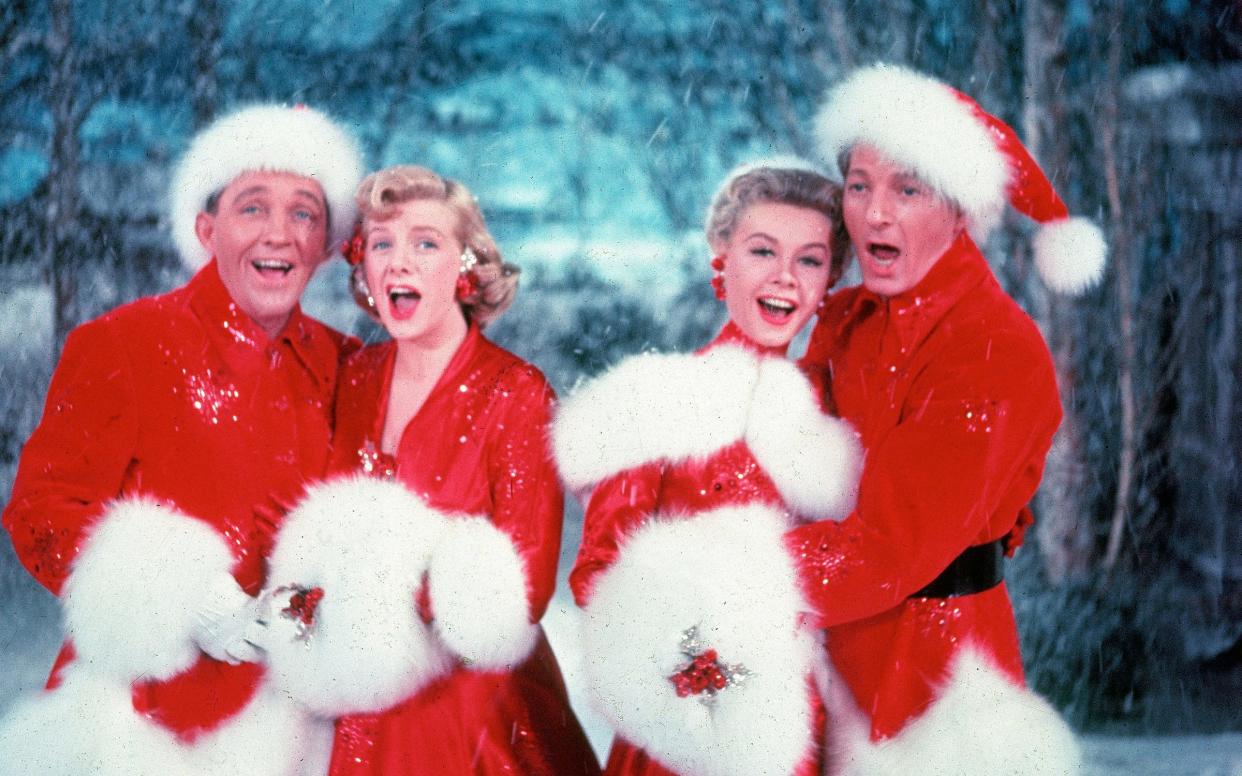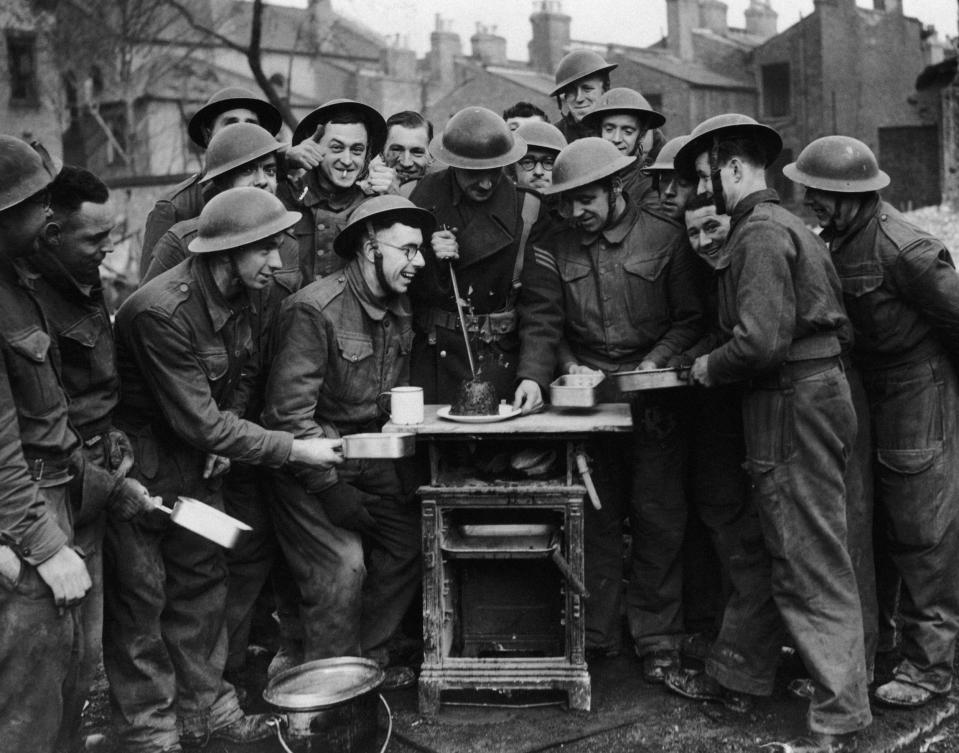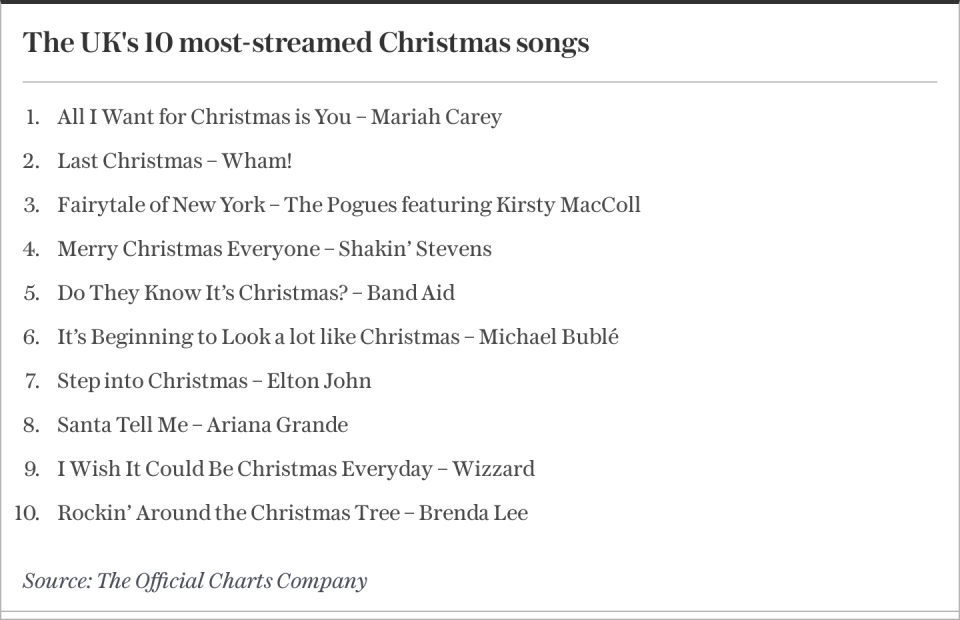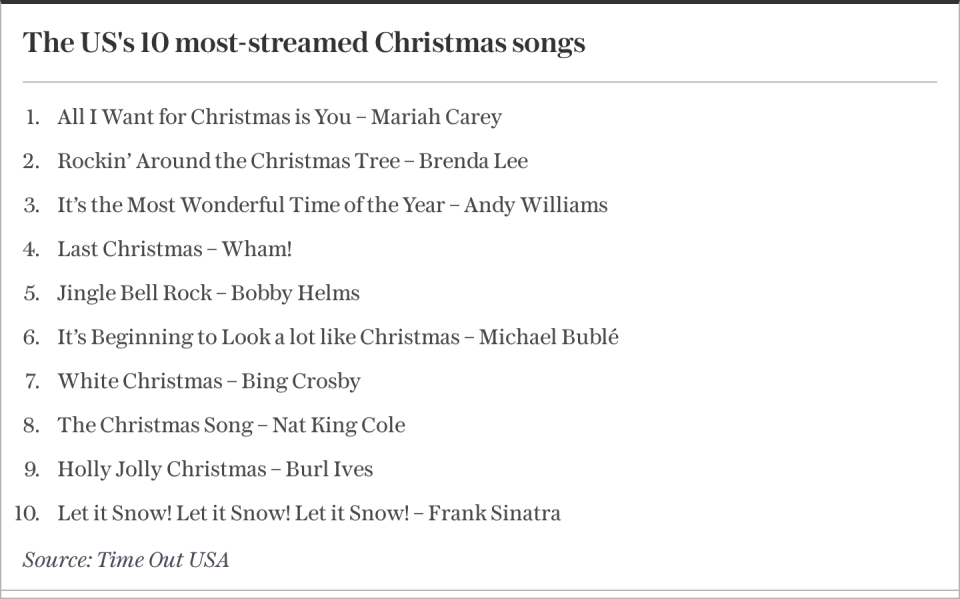‘They have no sense of irony’: why the US and the UK can never agree about Christmas songs

- Oops!Something went wrong.Please try again later.
“I’ll be home for Christmas, You can plan on me, Please have snow and mistletoe, And presents by the tree,” so sang American crooner Bing Crosby eighty years ago on his winsome wartime song I’ll Be Home for Christmas. The 1943 track was released to provide succour to overseas troops who longed to be back home for Christmas – if only, famously, in their dreams. The song was a runaway success in America, staying in the charts for 11 weeks and peaking at number three.
But things were very different in the UK. Far from salving the homesick hearts of soldiers and their loved ones, I’ll Be Home for Christmas was banned by the BBC’s music police, the Dance Music Policy Committee. The reason? It was sappier than a Norwegian spruce. The BBC thought its cloying message would lower morale. Specifically, the committee had a stated strategy of banning “sickly sentimentality which, particularly when sung by certain vocalists, can become nauseating and not at all in keeping with what we feel to be the need of the public in this country in the fourth year of war”. Auntie had spoken. Crosby’s song barely registered over here.
The track’s differing fortunes among Americans and Britons may seem like a quirk of history, but it’s actually symptomatic of the cultural chasm between the two countries when it comes to Christmas songs that continues to this day.
Indeed, the differences between what households in Manchester and Minnesota listen to over Christmas speak volumes about the two countries’ contrasting psyches. You say Santa Claus, and I say Father Christmas. Let’s call the whole thing off.
The divergence is best illustrated by comparing and contrasting recent lists of the ten most-streamed Christmas songs in the US and the UK. When universal evergreens such as Mariah Carey’s All I Want For Christmas Is You and Wham!’s Last Christmas are removed from both lists, the UK’s favourite songs lean towards the raucous and the novelty (Fairytale of New York by The Pogues and I Wish It Could Be Christmas Everyday by Wizzard) while the US favourites lean towards the traditional, the serious and the schmaltzy (Jingle Bell Rock by Bobby Helms and The Christmas Song by Nat King Cole). Where we’re bawdy and poppy, they’re gaudy and soppy.

“It’s religion versus music hall,” is the blunt assessment of Simon Bates, the former Radio 1 DJ and current presenter on Boom Radio. “Americans are earnest, desperately religious and lack a sense of humour. We, on the other hand, are a Rabelaisian lot. We take our religion in small packets and we appreciate it if we do, but fundamentally we’re music hall fans. We like panto. Panto has failed miserably in America. Every ten years they try it, and it’s always a catastrophe. They have no sense of irony and can’t say ‘It’s behind you!’”
Bates lived in America in the late-1960s and “had a great time but, boy, were they straight”. He puts the cultural difference down to Americans’ fear of shedding their inhibitions and their inability to “switch off”. He uses Chas & Dave as an example: the London boogie-woogie-knees-up duo released numerous Christmas albums and their 1982 Christmas TV special – set, inevitably, in a pub – was a staple in our schedules for years. “There’s no way Chas & Dave would tour the States when they were alive, even though Chas (Hodges, who died in 2018) was one of the greatest pop musicians in the world,” says Bates.
Holly Hudson is an American comedian and writer who has lived in London on and off for 20 years. As an expat American, she has wryly observed Christmas cultural differences for two decades. “Basically, Americans embrace and celebrate their sentimentality. We’re proud of it… But the Britons actively embrace anything that is lewd or dirty.”

Her US accent still intact, Hudson slowly recites the lyrics to The Pogues’ Fairytale of New York as if reading it for the first time. It is Britain’s third most-streamed Christmas song according to the Official Charts Company (and tellingly absent from equivalent US lists) and was written by English musician Jem Finer and late English-born Irishman Shane MacGowan. Hudson’s fresh delivery highlights its coarseness. “‘You’re a bum, You’re a punk, You’re an old slut on junk, Lying there almost dead on a drip in that bed,’” she laughs incredulously. “How does this come into a Christmas song?”
Then there’s Wham!’s Last Christmas. Although a US favourite too, its lyrics are uniquely Anglo-Saxon. ‘Last Christmas I gave you my heart, But the very next day you gave it away…’ It’s “brutal” as Hudson puts it. And then there’s Band Aid’s Do They Know It’s Christmas?, co-written by Scot Midge Ure with Irishman Bob Geldof. “‘There won’t be snow in Africa this Christmas time, The greatest gift they’ll get this year is life, Where nothing ever grows...’
This isn’t to say that all American Christmas music is “golly gee” niceness. Bah humbug outliers include Grandma Got Run Over by a Reindeer, a popular 1979 novelty song by country music couple Elmo and Patsy. And Christmas Wrapping – a 1981 song about ostensibly spending Christmas alone and eating “the world’s smallest turkey” – was recorded by new wave Ohio band The Waitresses (although revealingly it has been covered by Britons galore, from the Spice Girls to Sophie Ellis-Bextor).

The sheer size of America may mask an underlying subversive streak that we can’t see. Michael Mulligan, author of The Official Christmas No.1 Singles Book, explains that US music charts include radio airplay in their calculations, meaning that widespread play of, say, It’s the Most Wonderful Time of the Year by Andy Williams may give the song a perceived popularity that doesn’t actually exist.
This aside, Mulligan puts the difference between British and American listening habits down to an “anti-establishment vein” in Britain. It’s why we sent Mr Blobby and Bob the Builder to the top of the Christmas charts. Britons love the underdog. Or, in this year’s case, the undercat. The owners of Nala, the station cat at Stevenage railway station, have released a Christmas single called Check Meowt (really). It’s a potential chart-topper. This would never happen in the US. “We’ve got that great British underdog spirit poking the big organisations in the eye and saying, ‘No, record companies, we’re going to ignore what you say and do what we want,’” says Mulligan.
The prospect might make Bing Crosby turn in his grave, but with the proceeds going to the RSPCA nudging this one up the charts might still appeal to the sentimental in us all.

